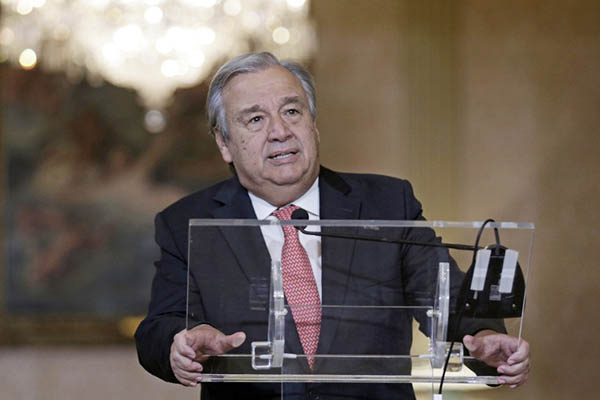
Jose Manuel Ribeiro—AFP
Antonio Guterres says he does not believe such measures can prevent terrorists from entering the U.S.
U.N. Secretary-General Antonio Guterres on Wednesday called for lifting a U.S. ban on travelers from seven Muslim-majority countries, saying the measures would not prevent terrorists from entering the United States.
“I think that these measures should be removed sooner rather than later,” Guterres told reporters. “Those measures indeed violate our basic principles and I think that they are not effective if the objective is to, really, avoid terrorists to enter the United States,” he said.
The appeal to end the travel ban came amid a mounting international outcry over the 90-day U.S. entry restrictions on citizens from Iran, Iraq, Libya, Somalia, Sudan, Syria and Yemen. U.S. President Donald Trump signed an executive order on Friday enacting the immediate ban and also suspending the arrival of all refugees for a minimum of 120 days while Syrian refugees were barred indefinitely.
Addressing the U.S. suspension of refugee resettlement and the ban on Syrians, Guterres again appealed to the U.S. administration to reverse course. “Resettlement is the must from the point of view of refugee protection,” said Guterres, who served as U.N. refugee chief for 10 years before his election as secretary-general. “I strongly hope that the U.S. will be able to re-establish its very solid refugee protection in resettlement and I hope that the Syrians will not be excluded in that process.”
Trump’s decision triggered protests and chaos at airports while U.N. human rights chief Zeid bin Ra’ad Zeid al-Hussein declared it illegal and “mean-spirited.”
Guterres, who took over from South Korea’s Ban Ki-moon on Jan. 1, argued that banning citizens from Muslim countries would not prevent terrorist organizations from mounting an attack on the United States. “We are dealing with very sophisticated terrorist organizations,” he said. “If a global terrorist organization will try to attack any country like the United States, they will probably not come with people with passports from those countries that are hotspots of conflicts today.”
“They might come with the passports from the most—I would say—developed and credible countries in the world or they might use people who are already in the country.”
Guterres had been criticized by human rights groups for failing to quickly condemn the travel ban, or making a pressing appeal to Trump to scrap it. His first formal statement on the issue came on Tuesday, four days after the ban was enacted.
The U.N. chief met with new U.S. ambassador Nikki Haley on Friday for what he described as a “very constructive” conversation about the relationship between the new administration and the United Nations. Asked about the U.S. threat of a major funding cut, Guterres declined to comment, saying he did not want to speculate on what possible decision lay in store.
The United States is by far the U.N.’s biggest financial contributor, providing 22 percent of its operating budget and funding 28 percent of peacekeeping missions, which currently cost $7.8 billion annually. “It’s no surprise that the U.N. has to treat the refugee ban very delicately,” said Martin Edwards, director of Seton Hall University’s Center for United Nations and Global Governance Studies. “The U.N. faces hostility from both the legislature as well as the White House,” he said.
Guterres said he was hoping to visit Washington to meet with Trump, but that no date had been set for the talks.
